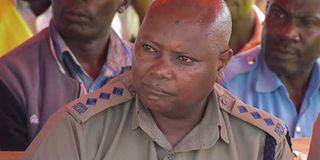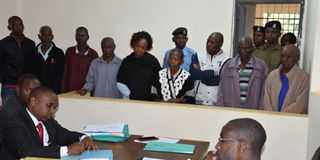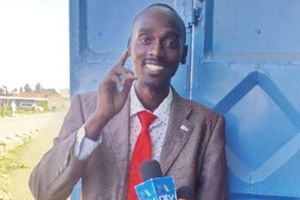
The murder tapes.
For five months before April 30, 2019, anger was brewing and could be felt in the vast Kamaindi village in Tharaka Nithi County.
What followed was a series of murders that left five people dead and nine suspects jailed for 30 years each.
For 21 hours as from the evening of Tuesday, April 30, 2019, four people who include Josphat Mayau Mukengu (Kamaindi village chief), Chuka Officer Commanding Station (OCS) at the time Joseph Kinyua, David Ikaba, a businessman who owned a butchery, and Daniel Mwiti, a police informer, were killed.
The anger that was brewing within the village was as a result of a bitter dispute over the use of the waters of River Thuci.

A deserted homestead in Kamaindi, Tharaka-Nithi County on May 3, 2019. PHOTO | ALEX NJERU | NATION MEDIA GROUP
This was after Gikware Mukengu, a brother of the chief, diverted the river and warned locals from trespassing into his compound in search of water.
But let’s first go back to December 2018.
Then, Mr Gitonga Kibuibe left his home and passed through the riverside where animals he was grazing could quench their thirst.
That was the last time he was ever seen, and even after some bones were found at the exact spot where he was last seen and villagers claimed that those were Kibuibe’s remains, no one was arrested. This angered the locals.
On the day the chief was killed in cold blood, Gikware was at his home as usual with his wife.
Gikware vividly remembers how it all started and even witnessed how his brother was killed.
He narrated how goats had made their way into his parcel of land and how he kept sending them away.
“The goats entered my farm thrice, and I chased them away all that time. We all know that it is wrong and even against the law,” he said, adding that he had no option but to reach out to his brother (the area chief) to solve the matter.
By 6pm on that day, the chief was seen walking into Gikware’s homestead but at that time, the goats had been handed back to the owner known as Julius Mburu Kinanga.
However, moments later, Kinanga and his wife started screaming as they called for help, claiming that their goats had been stolen and that they had spent the better part of the afternoon looking for them.
Mr Eliud Muchiri, the late chief’s son, was among many villagers who heard the screams.
“When noise came from the direction of my uncle’s homestead, I was disturbed and tried to call my father, the chief, but the phone did not go through,” Mr Muchiri said.
But as the son made the calls, his father, Chief Mukengu, was already at his brother’s compound.
As the noise of Kinanga and his wife became louder, several villagers alongside Mr Kinanga confronted the chief and his brother.
Mr Gikware said as the confrontation went on, one of the people—whom he refused to name in the interview—hit the chief on the head with a stone and another person cut his leg using a machete and he fell.
However, while giving his testimony in court, Mr Gikware had pinpointed the seventh accused in the case, identified as Mr Njagi Kibiubi, as the person who hit the chief using the stone.
The chief then questioned whether the whole matter had turned out to be a fight, and it is then that the sixth accused person, Julius Njeru Kimenye, cut the chief on the back using a machete.
“The chief then tried to flee the scene after being badly injured, but he was prevented by Ms Leah Muthoni Ngigi and that is how things worsened,” said Mr Gikware.
'Witnessed my brother's murder'
In a testimony in regards to the events, Mr Gikware’s wife, who was not at home when the Nation team visited, informed the court that she was the one that locked her husband in the house.
It is from inside his house that Mr Gikware says he watched how his brother was killed.
He was peeping through the window as his brother was being subjected to mob justice.
“My wife left me in the house and rushed to the scene questioning the locals on why they had ended the life of the chief,” he said.
Moments later, word went round that the chief had been murdered and tens of police officers were deployed to the village.
Mr Gikware said that the officers arrived in the village with more than 10 police land cruisers.
Probe begins
As investigations kicked off, a number of names were mentioned and the OCS decided that he would head to Embu to arrest a businessman identified as David Ikaaba.

The late Chuka OCS Joseph Kinyua. He was murdered on May 1, 2019.
Ikaaba had fled the village and headed to Embu as he had been adversely mentioned during the investigations.
The person who was to identify Ikaaba was one; Daniel Mwiti the son of Mr Gikware.
Mr Muchiri, the son of the late chief, said that they had already been informed of the whereabouts of Ikaaba.
“One of the suspects had already fled. He was being pursued by the police with the help of an informer,” Mr Muchiri said.
Alongside 12 police officers, the OCS arrived at Ikaaba’s workplace located in Embu Town. The attempted arrest would again lead into yet another bloodbath.
More violence, multiple deaths
Learning that the officers were after him, Ikaaba alongside his workers stormed out of the busy butchery armed with axes and sticks as they tried to obstruct the police from making any arrest.
The workers concentrated on Mwiti while Ikaaba allegedly went after the OCS, killing him on the spot. A few seconds later he was shot dead by police officers.
Mr Gikware said that he later received a call and was informed that his son had been killed.
The anger that had lasted for months within the village led to a bloodbath that attracted tension.
This then saw the National Police Service (NPS) command deploy officers attached to the General Service Unit (GSU) to restore order in the village.
During the interview by reporters, the Nation also reached out to Ms Eunice Kihiko, who served as the police commander.
'Planned vendetta'
“The killing of the chief and his nephew appears to have been a bottled-up vendetta against the local administrator,” she said.
According to locals, the brutal killings were sparked by a long-running land dispute between the chief; his brothers, Gikware and Njoka Mukengu, and their neighbours.
Allegations were made that in December 2018, Mr Gikware and his sons had warned villagers against fetching water or watering their animals at a certain point of the river which they ended up closing the road heading there.
Ms Sonia Murugi, a villager, said that locals were also angered with the disappearance of Mr Kibuibe.
“Before the death of the chief, the bone of contention for the villagers of Kamaindi was the death of a villager and the fight to control the precious waters of River Thuci, which residents had earlier accused the slain chief’s brother of diverting,” she told the Nation.
It was then that one of Mr Gikware’s sons, identified as Simon Mureithi, offered to take reporters to the place that they believe was the bone of contention.
Prosecution
After three years on trial, Justice Lucy Gitari then put a total of nine accused on their defence.
The nine include 70-year-old Gerald Njeru M’ibua, 70-year-old Julius Mburu Kinanga, Gerald’s wife, Cecilia Katora, 65, John Nthiga Kirema, 64, his wife, Leah Muthoni Ngigi, 52, and Nthiga’s brother, identified as Julius Njeru Kimenye, 65.
Others are Jornard Njagi Kibiubi, 44, Gediel Munyua Murugu, 68 and Tom Kinyua Njoka, 41.

The nine suspects in the murder of Kamaindi chief Japheth Mayau Mukengu at the Chuka High Court on May 23, 2019.
The nine accused denied being at the scene of the gruesome murder of the chief.
However, the evidence of nine witnesses who were called by the prosecution ended up finding them guilty.
The key witness was Mr Gikware who shared everything that he witnessed from inside his house.
He told the court that he watched everything from his window.
Mr Gikware’s wife, who was prosecution witness number four, and their daughter who was in this kitchen at the time of the deadly violence, testified as witness number 5.
Justice Lucy Gitari rejected the accused’s defence that these witnesses were family members and were bound to mislead and were indeed misleading the court.
The judge ruled that if they saw, then they did, and in any case, she said, they were not the only eye witnesses.
After all, Prosecution witness number three, John Mwindu Karangu, told the court that he was a church leader and had attended a church meeting on the day of the killing.
He said that the meeting ended at about 5.30pm and that he took some two bursary forms to the chief’s office, but he did not find him, so he proceeded to the chief’s home.
According to him, even before he could reach there he heard some noise emanating from Mr Gikware’s home where he saw the chief talking to 12 people.
All the nine suspects tried to inform the court that they had been framed because of a land dispute they had with Mr Gikware.
Even the prosecution itself told the court that the murder of the Kamaindi chief had a land dispute written all over it.
However, Justice Lucy Gitari agreed that in as much as land was being mentioned as being at the center of the murder it would not make one accuse another person for killing.
In her conclusion, Justice Gitari concluded that the witnesses had identified the accused persons, the owner of the goats admitted to mobilizing people, and that the defence was not being truthful.
With that, she convicted the nine under the doctrine of common intention. Murder it was and murder it remains.
The nine people who brutally killed the chief will each serve 30 years’ in jail.
Nation has learned that Nthiga Kirema and his wife Leah Muthoni have filed an appeal at the Nyeri Court of Appeal seeking to overturn the Chuka High Court judgement.
This is a text version of Murder Tapes, a programme that unravels real-life mysteries on killings, airing every Thursday, 9:30pm, on NTV













